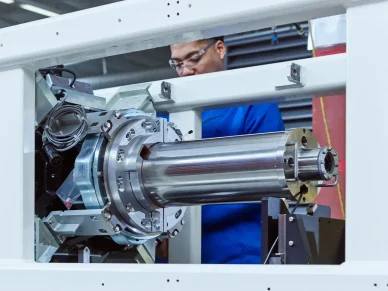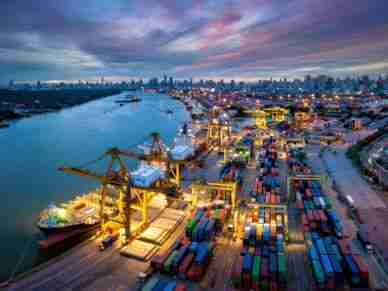View This Article in BOSS Magazine
Corning’s supply chain visibility helps customers – and the world – stay on track
At some point, we’ve all benefitted from the life-changing technologies Corning Incorporated has developed, including the invention of low-loss optical fiber, the creation of the touch-responsive glass used in billions of smartphones, innovative clean-air technologies and automotive glass, and revolutionary drug storage and delivery with novel glass packaging. Corning is a 170-year-old materials science pioneer with a crystal-clear mission: to improve our lives and play a vital role in the world’s progress.
A fearless approach to creativity in supply chain – whether it’s innovation in material sourcing, supplier relationships, or corporate responsibility – helps fuel Corning’s mission. Cheryl Capps, the company’s Senior Vice President and Chief Supply Chain Officer, recently gave BOSS a glimpse into that approach.
“We think about supply chain in terms of plan, source, make, deliver, and enable, and those functions are embedded within all of our businesses,” she said.
A shared service model for Corning’s supply chain operates for the good of the whole corporation, rather than by division or plant. For example, because the company uses industrial minerals in every plant, material experts on a corporate level support Corning’s individual businesses.
Capps and her team examine Corning’s end-to-end supply chain performance – from the supplier’s supplier to the customer’s customer. That includes environmental and social responsibility aspects as well. For example, Capps looks at everything from energy to conservation of materials to greenhouse gas reduction to carbon neutrality. And from a social responsibility standpoint, the team includes supplier diversity, anti-slavery, and fair labor practices in their end-to-end supply chain analyses.
The criteria for awarding contracts go beyond price, particularly in the areas of social responsibility and sustainability, of which Capps said, “It has to be embedded in every step of the process, and then it just takes on a life of its own.”
Corning’s leadership role on the world stage compels them to do more, including moves that transcend its supply chain, Capps said.
“We can drive the industry, our supply base, and we can influence our customers,” she said. “We can be a role model for other companies to adhere to good practices.”
In some areas of the world, contract manufacturing can be vulnerable to poor labor practices, Capps said, so Corning comprehensively audits its contract manufacturers, particularly those in risky geographies or industries. Companies must reach a minimum score on that audit to be a Corning contract manufacturer.
The Ultimate Disruptors
Corning is on the leading edge of handling disruption at a time when global indicators show that volatility, uncertainty, and disruption are at historic highs. In most markets, disruption is occurring at 10 to 12 times pre-pandemic levels.
These issues – such as the increased need for air shipping or hiccups with alternative materials and suppliers – are costly.
“Disruption is a key driver of global inflation, so to keep costs down for our customers, we’ve become really good at responding quickly. Our businesses don’t miss a beat,” Capps noted.
Project Proteus, which Corning launched soon after the Suez Canal blockage of 2021, is part of that response. The Corning team members realized that if they purchased closer to where they manufactured and had more qualified suppliers, they could have pivoted more quickly and avoided excess costs.
The project redesigns supply chains to minimize risk and add resiliency with a regionalization strategy that simultaneously increases the number of qualified suppliers or alternate materials, as well as an operational strategy that keeps inventory close to Corning’s plants, rather than its suppliers.
In areas where the Proteus strategy has been executed, the number of disruptions that would have been experienced by the company has been reduced by more than 75%.
“We're really excited by those results,” Capps said. “We’re putting more resources on the program to allow us to move faster and achieve more.”
Corning has discovered that, in most cases, shrinking the supply chain surface area and building in resiliency also reduces costs and benefits cash flow.
“As a bonus, these changes are usually good for the environment. In fact, more than half of the programs actually have a positive impact on reducing our carbon footprint. A lot of times people think that cost reduction programs or programs that are good for business are not necessarily good for the environment and vice versa,” she said. “We've proven that what is good for the environment is in fact good business.”
Capps said the key to Corning’s supply chain resilience is the company’s culture of innovation – more specifically, its ability to incorporate new digital tools.
“Despite all of the disruption over the past three years, we have kept our plants running and maintained our high level of service to our customers,” she stressed, noting that Corning’s operations ran without interruption throughout the pandemic. “Our advanced capabilities in detecting and triaging disruptive events in the supply chain, as well as the ability to solve for problems before they impact us, are the key to this success.”
Because of this, the company has been recognized by several industry associations for its contributions to creating a truly future-forward approach to supply chain management.
“Our innovative culture has helped us develop, test, and deploy new processes and capabilities that are second to none,” explains Capps. “When it comes to innovation culture in supply chain, we’ve done some pretty special things.”
Corning is one of the world's leading innovators in materials science, with a 170-year track record of life-changing inventions. Corning applies its unparalleled expertise in glass science, ceramics science, and optical physics along with its deep manufacturing and engineering capabilities to develop category-defining products that transform industries and enhance people's lives. Corning succeeds through sustained investment in RD&E, a unique combination of material and process innovation, and deep, trust-based relationships with customers who are global leaders in their industries.
Corning's capabilities are versatile and synergistic, which allows the company to evolve to meet changing market needs, while also helping our customers capture new opportunities in dynamic industries. Today, Corning's markets include optical communications, mobile consumer electronics, display technology, automotive, and life sciences vessels. Corning's industry-leading products include damage-resistant cover glass for mobile devices; precision glass for advanced displays; optical fiber, wireless technologies, and connectivity solutions for state-of-the-art communications networks; trusted products to accelerate drug discovery and delivery; and clean-air technologies for cars and trucks.
Corporate Office
One Riverfront Plaza
Corning, NY 14831
Phone Number: 607.974.9000
Homepage Link: https://www.corning.com/


















